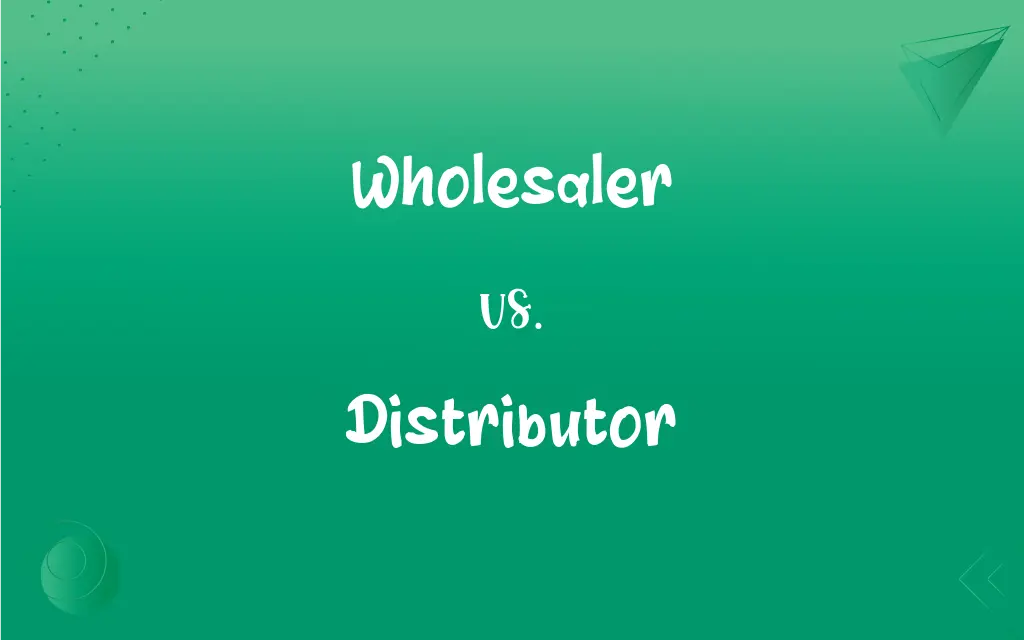Wholesaler vs. Distributor: What's the Difference?
Edited by Aimie Carlson || By Harlon Moss || Updated on October 20, 2023
A wholesaler buys products in bulk and sells them to retailers; a distributor connects manufacturers with retailers, often providing added services.

Key Differences
Wholesalers primarily engage in the business of buying large quantities of goods directly from manufacturers or suppliers. Distributors, on the other hand, serve as an intermediary between the manufacturer and the retailer or end-user. Their role is not just to buy and sell but to also ensure the product reaches the intended market.
Wholesalers typically have a more straightforward model, focused on selling products to retailers or other businesses in large quantities. Distributors, in contrast, might offer additional services, such as marketing support, product training, or after-sales services. This makes their relationships with manufacturers and retailers more intricate.
Wholesalers are largely concerned with the volume of products, as they benefit from economies of scale. Distributors, while also concerned with volume, place emphasis on the breadth and depth of the product mix, ensuring that a wide range of products from various manufacturers reach different retailers.
Wholesalers usually have a shorter supply chain and might deal with fewer products or brands compared to distributors. Distributors tend to have more extended relationships, as they connect the manufacturer to a range of different retailers, ensuring products are well-distributed across various platforms or geographical locations.
Wholesalers may often have a direct relationship with the end retailer, where the primary focus is the transfer of goods. Distributors take on a broader role, not only transferring goods but also being pivotal in brand representation, often ensuring that the brand's image and value are communicated effectively to retailers and consumers.
ADVERTISEMENT
Comparison Chart
Primary Role
Sells in bulk to retailers.
Serves as intermediary between manufacturer & retailer.
Service Offering
Primarily selling.
Might offer marketing, training, or after-sales services.
Product Range
Fewer products/brands.
Wide range of products from various manufacturers.
Supply Chain Length
Shorter, direct to retailers.
Longer, connecting manufacturers to multiple retailers.
Relationship Focus
Transfer of goods.
Brand representation & product distribution.
ADVERTISEMENT
Wholesaler and Distributor Definitions
Wholesaler
A wholesaler often operates from a warehouse or distribution center.
The wholesaler's warehouse on the outskirts of the city was massive.
Distributor
A distributor is an intermediary entity that ensures products get from manufacturers to retailers.
The car manufacturer chose a reliable distributor to handle their new model's launch.
Wholesaler
A wholesaler can provide significant discounts to retailers due to high-volume purchases.
By sourcing from the wholesaler, the retailer managed to save 20% on costs.
Distributor
A distributor handles a diverse range of products, often from different manufacturers.
The distributor's catalog featured a multitude of brands from various industries.
Wholesaler
A wholesaler is a person or entity that buys goods in large quantities for resale to retailers.
The wholesaler secured a good deal for bulk purchase of electronics.
Distributor
A distributor might offer additional services, such as marketing or training, to support product sales.
The software distributor provided training sessions for the new software's users.
Wholesaler
A wholesaler typically deals in one specific industry or type of product.
The fashion wholesaler showcased the latest trends for the upcoming season.
Distributor
A distributor maintains relationships with both the manufacturer and the retailer.
The distributor acted as a bridge, resolving issues between the manufacturer and local stores.
Wholesaler
A wholesaler specializes in selling products to businesses rather than direct to consumers.
The local grocery store sourced its fresh produce from a regional wholesaler.
Distributor
A distributor plays a key role in brand representation in the market.
The beauty product distributor organized events to promote their brand's value to retailers.
Wholesaler
The sale of goods in large quantities, as for resale by a retailer.
Distributor
One that distributes, especially a device that applies electric current in proper sequence to the spark plugs of an engine.
FAQs
What's the primary role of a wholesaler?
A wholesaler buys products in bulk and sells them to retailers.
What types of services might a distributor offer?
Distributors might offer marketing support, product training, or after-sales services.
Can a business be both a wholesaler and a distributor?
Yes, some businesses may operate in both capacities, depending on their agreements and services.
Do distributors focus more on quantity or brand representation?
While volume is essential, distributors often focus heavily on brand representation in the market.
How do wholesalers source their products?
Wholesalers typically source products directly from manufacturers or large suppliers.
Are wholesalers always linked to a specific industry?
Often, wholesalers specialize in one industry or type of product, but not always.
Is it accurate to say that all distributors are wholesalers?
No, while both deal in bulk, their roles and services can differ significantly.
Why might a retailer choose to buy from a wholesaler?
Retailers can get significant discounts and bulk quantities from wholesalers.
Where do wholesalers typically operate from?
Wholesalers often operate from warehouses or distribution centers.
Can a distributor influence a product's market success?
Yes, through effective distribution, marketing, and brand representation.
Do wholesalers deal with product returns?
Yes, wholesalers might handle returns, depending on their agreement with retailers.
How does a distributor differ from a wholesaler?
A distributor connects manufacturers with retailers and might offer added services.
Do wholesalers sell directly to consumers?
Wholesalers typically sell to businesses, not directly to end consumers.
Are distributors typically tied to one manufacturer?
No, distributors often handle a range of products from various manufacturers.
How do distributors add value to the supply chain?
Distributors can bridge the gap between manufacturers and retailers, offer added services, and ensure broad product distribution.
Do distributors need a deeper understanding of the products they handle?
Yes, especially if they offer services like marketing and training, a deep product understanding is crucial.
What's a key benefit for manufacturers using distributors?
Distributors can provide broader market access, manage multiple retailers, and offer additional services to promote the product.
How do wholesalers offer competitive prices?
Wholesalers benefit from economies of scale by buying in large quantities, allowing for discounted rates.
How do distributors handle multiple manufacturers?
Distributors maintain relationships with multiple manufacturers, ensuring a diverse product mix for retailers.
Can a business start as a wholesaler and evolve into a distributor?
Yes, as a business grows and expands its services, it can transition from wholesaling to distribution.
About Author
Written by
Harlon MossHarlon is a seasoned quality moderator and accomplished content writer for Difference Wiki. An alumnus of the prestigious University of California, he earned his degree in Computer Science. Leveraging his academic background, Harlon brings a meticulous and informed perspective to his work, ensuring content accuracy and excellence.
Edited by
Aimie CarlsonAimie Carlson, holding a master's degree in English literature, is a fervent English language enthusiast. She lends her writing talents to Difference Wiki, a prominent website that specializes in comparisons, offering readers insightful analyses that both captivate and inform.































































